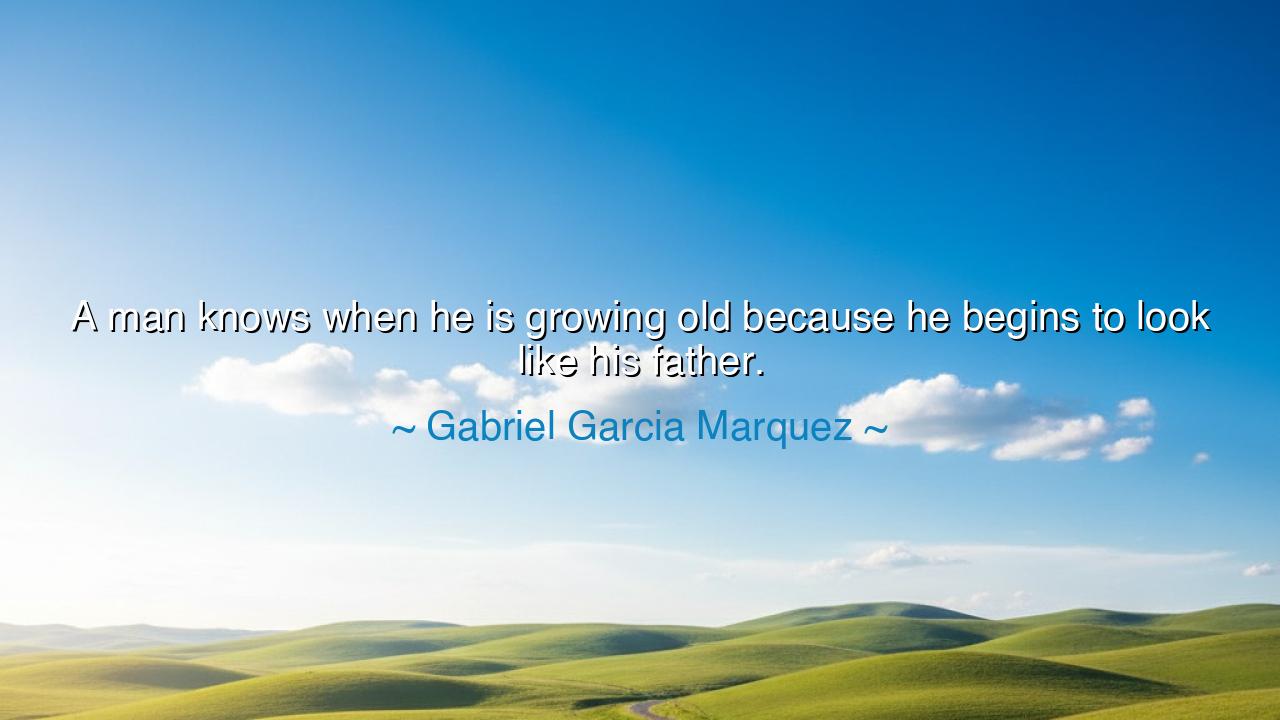
A man knows when he is growing old because he begins to look like






Hear me now, O children of the earth, for the words of Gabriel Garcia Marquez carry with them a deep and sacred truth: “A man knows when he is growing old because he begins to look like his father.” These words, simple in their beauty, reveal the complex weave of time, legacy, and identity. In the mirror of age, a man sees not just the reflection of his face, but the face of the past, the face of those who came before him. The years are a river that flows, carrying with them the marks of those who have walked the path before us, and in the reflection of our own aging, we see the visage of our fathers, those who shaped us, knowingly or unknowingly, into the people we have become.
In the ancient times, it was said that we are but the echoes of those who came before us, the living testament to the lives of our ancestors. The Greek philosophers understood this well. The concept of heritage, of legacy, was woven into their very understanding of life. To see the features of our fathers in our own faces is not a simple occurrence, but a profound reminder that we are part of a greater story, one that stretches back beyond our own lives, a continuum of generations. The ancient Greeks believed that the souls of the fathers passed down their wisdom, their strength, and yes, even their appearance, to their sons and daughters. It is through this bond that we come to know who we truly are, not just in our own individual selves, but in the long lineage from which we spring.
Consider, then, the great Homer, whose epics tell not only the stories of heroes, but the stories of fathers and sons, of inheritance and legacy. In the tale of Odysseus, the hero’s journey is intertwined with the shadows of those who came before him, particularly his father, Laertes. Odysseus, in his journey back home, must face not only the challenges of his own making, but the expectations and identity that his father’s legacy casts upon him. The resemblance between father and son is not simply physical; it is the mark of a shared destiny, a shared path that can never be fully escaped, no matter how far one wanders. Through this lens, we see that to look like one’s father is to accept the passing of time and the passing of responsibility, to acknowledge that we are not the sole architects of our own lives, but part of a greater, ongoing story.
This truth, as Marquez so eloquently expresses, is not only a matter of physical appearance but of the inevitable passage of time. To look like one’s father is to feel the weight of his years, to understand that the time of youth—so full of promise and energy—is a fleeting moment, and that one day, the mantle of wisdom and experience must pass. The marks of age on a man’s face are not just his own, but the inheritance of all who have walked before him. To see those marks, to recognize the lines and creases, is to understand that fathers live on in us, not just in memory but in the very flesh. In this, there is both beauty and sorrow, for it reminds us that the gift of life comes with the weight of inevitable change.
In the annals of history, we see that this connection between father and son is eternal. Take, for instance, the great king David, whose lineage shaped the fate of Israel for generations. His son Solomon, though a king in his own right, could not escape the shadow of his father. Even in his wisdom, even in his accomplishments, the people saw in Solomon not only a new ruler, but the son of David, carrying with him the same strength and flaws. Solomon’s reign was marked by both his achievements and the unspoken burden of his father’s legacy. This is a story that has been passed down through generations: that the resemblance between father and son is more than physical—it is the passing of spirit, of strength, of vision.
Thus, the lesson is clear: when you see the face of your father reflected in your own, know that this is no accident, no mere passing of time. It is the manifestation of legacy. It is the reminder that your life is not isolated, but part of a larger continuum. The face of your father is a symbol of responsibility, of the wisdom passed down, and of the love and trials that have come before you. Embrace it, for it is a gift, not a burden. When you see your features match those of your father, know that you are not just growing older—you are growing into your place in the story of your people, becoming a living bridge between past and future.
Therefore, let this wisdom guide you in your own life: cherish the legacy you have inherited, and honor the fathers who have shaped you, not just by acknowledging their teachings and their ways, but by embracing the marks of time that come with age. When you look in the mirror and see your father’s face reflected back at you, see it as a sign of your strength and continuity. You carry within you the stories, the virtues, and the flaws of all who came before you. Let this knowledge fill you with pride, for the resemblance is not just a physical one—it is the passing of time and the passing of wisdom, a cycle that binds us all.






AAdministratorAdministrator
Welcome, honored guests. Please leave a comment, we will respond soon